Guinea
Guinea, in long form the Republic of Guinea, also unofficially called Guinea-Conakry by the name of its capital to differentiate it from Guinea-Bissau and Equatorial Guinea, is a country in West Africa. Rich in natural resources, it is nicknamed the “water tower of Africa” and has a third of the world’s bauxite reserves, it is nicknamed the “geological scandal”. It became independent from France on October 2, 1958, making it the first country in sub-Saharan French Africa to do so. Guinea is a republic. Its president, directly elected by the people, is head of state and appoints a Prime Minister who is head of government. The unicameral National Assembly is the country’s legislative body and its members are also directly elected by the people. The judiciary is dominated by the Supreme Court of Guinea, the highest court of appeal in the country.
The term Guinea traditionally designates the region of Africa which lies along the Gulf of Guinea, which extends north through tropical and subtropical humid deciduous forests and ends in the Sahel. Guinea is a predominantly Muslim country, with 85% of the population. The Guinean population is divided into twenty-four ethnic groups. French, the official language of Guinea, is the main language of communication in schools, public administration and the media. But more than 24 national languages including Maninka, Poular, Sosso, Guerzè, Toma and Kissi are widely spoken as dialects of more common exchanges between populations at the expense of French. The Guinean economy is largely dependent on agriculture and mining production. It is the world’s second largest producer of bauxite and has reserves of diamonds and gold. In 2011, the United States government claimed that acts of torture by the security forces and the ill-treatment of women and children (for example, female genital mutilation) constituted human rights abuses in Guinea. In 2014, the country was hit by the Ebola epidemic.
Guinea’s history
Ancient history
For 3,000 years Guinea has been inhabited by a community of fishermen and farmers, in the green valleys of Fouta Djallon, the fertile basins of Haut Niger favorable for gathering, hunting and fishing have attracted men. The arrival of the populations is due to the drying up of the Sahara, followed by the drying up of rivers and streams. Populations move to the wetter southern areas. The territories located between the Senegal and Niger rivers such as Guinea are becoming privileged areas for the gathering of pastoralist and agricultural communities. While some groups are heading to the Bafing and Falémé valleys, others have settled in the inner Niger Delta. The first kingdoms were born in this region in the first millennium BC. Most of the Guinean territory was an integral part of the empires of Ghana and Mali which succeeded each other between the ninth century and the sixteenth century. The decline of the Mali Empire coincided with the appearance in 1445, in Senegambia, of the first Portuguese caravels. The Mandingos lost control of the Saharan tracks to the benefit of the Songhay and flowed back to the western regions of Guinea, Gambia and Casamance. After a few skirmishes, the Portuguese navigators and the coastal populations made peace. The Portuguese, interested in gold, hides and other exotic products from Sudan, spices, slaves, sold fabrics, iron utensils, even horses. The mansas of Mali established diplomatic relations with their counterparts in Portugal.
Thanks to this nascent trade, population movements are draining maraboutic and merchant families from the Middle Niger to Gabou and the Atlantic coast to give the known socio-political configuration to the colonial conquest. Between 1456 and 1460, Pedro de Sintra landed at Cape Verga and further south, he reached the tip of the island of Tombo where Conakry is located. The Portuguese gave the names of Rio Nunez, Rio Pongo (deformation of Araponka), Rio Kapatchez, etc. to rivers in the coastal zone. Off Conakry, the islands called “Ilhas dos Idolos” (islands of idols) were discovered because the inhabitants of these islands, when they come to sow the rice, bring their idols which they adore. These navigators noted that the Portuguese came into contact with the Landouma and the Nalou in the Rio Compagny and the Rio Nunez. They also reported the presence of Djallonké inland. Relations with the Bagas were difficult between the Rio Nunez and the Kaloum peninsula. They attest to the existence of three Suzerains in the coastal region: Farin Souzos (king of sosso), Farin Cocoli (king of Lanlouma) and Farin Futa (king djallonka). Thus were born the Sosso kingdoms of Bramaya, Thia de Lakhata and Dubréka. In the sixteenth century, the Dubréka kingdom asserted itself with the dynasty created by the warlord Soumba Toumani. In the Upper Niger region, groups of Sarakollé marabouts from Djafouna settled towards the end of the 17th century, settling in Mandé between Niger and the Milo. They found the kingdom of Batè (between two rivers) of which Kankan is the metropolis.
The villages they found are Diankana, Foussén, Karifamoriah, Bankonko, Forécariah, Tassilima, Nafadji. They are engaged in trading and teaching Koranic. Islam was, by their action, reintroduced to Manding after a long parenthesis following the fall of the Mali Empire. In the eighteenth century, Kankan, the metropolis of Batè became the capital of a powerful kingdom thanks to the commercial activities and the reputation of its marabouts, of which the patriarch Alpha Kabiné was one of the most illustrious. In the middle of the 18th century, a Maninka group left Batè and came to settle at the mouth of the Mellacore, where they founded the province of Moréah. This group was made up of the Touré, Youla, Sylla, etc. clans. He was under the leadership of patriarch Fodé Katibi Touré, founder of Forécariah, as in Fouta-Djalon, the leaders of Moréah take this title from Almamy. The forest region seems less disturbed by these population movements. However, we note that the Kissi, coming from the north, would have transited through Faranah (Kobikoro) before settling in their usual habitat where they would have rocked the Loma, who seem to be the first occupants. The Kpelle, Manon and Konon are said to have left Moussadou (Beyla prefecture) under the pressure of the Maninka, to settle in the heart of the forest in the south of the country.
Pre-colonial era
The Nalou and the Baga populate the region in the eighth century. From the ninth century to the eleventh century, the Mandingo kingdom, vassal of the Empire of Ghana, was established from upper Senegal to upper Niger. They will be joined by Jalonkés of mandated origin. In the 13th century, the legendary Soundiata Keïta formed an immense empire with the capital Niani (today a small Guinean village). The Mali Empire declined in the fifteenth century. Meanwhile and until the eighteenth century, the Fulani brought Islam to the region, pushing the Soussous towards the coast. It is on the coasts that the Soussous and other ethnic groups forge links with European traders wanting to get slaves, ivory and maniguette (or malaguette, plant close to ginger and reputed to be an aphrodisiac). It is triangular trade.
Guinea’s politics
Guinea is a republic, with a president elected by the people for a five-year term as head of state. This period initially fixed at 5 years was modified to 7 years by the Constitution of 2003, then re-modified by the National Council of Transition (CNT) in 2010 for a duration of 5 years renewable once. The office of president was occupied by Lansana Conté from April 5, 1984 to December 22, 2008. The Prime Minister is appointed by the Head of State. Since November 15, 2010, after the first free presidential election since independence in 1958, Alpha Condé is elected head of the country in the dispute. Since the establishment of multiparty politics in April 1992, some 40 new parties have been recognized. The legislative power is ensured by a parliament made up of only one room, the National assembly, where sit 114 deputies elected by the people for a mandate of 5 years. The Constitution and the National Assembly were suspended in December 2008 after the CNDD coup led by Captain Moussa Dadis Camara. The new constitution was adopted by the CNT on April 19, 2010 and promulgated by General Sékouba Konaté by decree on May 7, 2010. The NGO Transparency International regularly ranks Guinea among the countries where the perception of corruption is the strongest. The theme of corruption is recurrent in the demands of opponents and union organizations in Guinea.
Guinea’s economy
Currency
In the territory of the Republic of Guinea, the currency in use since 1960 is the Guinean franc, except between 1972 and 1986, the period during which the currency was the syli (en). The Guinean franc is not used in any other country, but is exchangeable with money changers exercising near the borders with the currencies prevailing in the riparian countries (the CFA franc, the Liberian dollar, the Sierra Leone leone and also the euro and the dollar). The central bank of Guinea also allows exchange, but at unattractive rates and only in Conakry.
Guinea’s demography
The Guinean populations were affected on the one hand by the Arab-Muslim trade in the direction of the Maghreb and Egypt, and by that which began in the sixteenth century and carried out beyond 1850, via the French colonial conquests and forced labor that they brought. The Second World War (1939-1945) weakened colonizing France and pushed it to finally abolish the indigenous, and forced labor in 1945. With this date begins the demographic boom, the population doubling every 20 years. Following the independence of October 2, 1958 and the departure of French credits and cadres who operated the Guinean administration and economy, Guinea was destabilized. The dictatorship of Sékou Touré then prompted many Guineans, especially elites, to emigrate to developed countries.
In July 2016, Guinea would have 12,093,349 inhabitants. According to the World Refugee Survey 2008 published by the United States Committee for Refugees and Immigrants, Guinea was hosting nearly 29,300 refugees and asylum seekers at the end of 2007, mainly from Liberia, Sierra Leone, and Ivory Coast. As of December 2007, 11,900 refugees were living in one of three camps, Lainé, Kankan I and Kankan II, and at least 9,300 refugees were living in urban areas. In 2011, the estimates of refugee populations in Liberia and Côte d’Ivoire were 5,400 and 6,552 respectively, or almost 12,000 people. The Guinean population is relatively young since 61.6% of Guineans are under 25 years of age, while the 25-54 age group constitutes 30.4% of the population. The remaining 8% are made up of Guineans over the age of 54, of which only 3.6% are over the age of 65.
Guinea’s languages
The official language of the Republic of Guinea is French. It is the language of the state and official institutions. After the regime of Ahmed Sékou Touré, French has once again become the single language of instruction in schools. The French language is a rapidly expanding language in Guinea according to the latest reports. In 2002, the number of speakers of French mother tongue was estimated at 2% of the total population. According to the Guinean authorities, a new estimate from 2007 revises this figure sharply up compared to that of 2002: the number of Francophones would reach 21.1% and the number of partial Francophones 42.1%. The combined total represents 6 million people, or 63.2% of the total population with a partial or complete command of this language. English is present in the border regions with Liberia and Sierra Leone, it is a university and commercial language. The three main languages of African origin are: the pular spoken mainly in Middle Guinea, that is by more than 32% of the Guinean population, which has many speakers in other regions Malinké, spoken mainly in Upper Guinea and Kpelle or Guzé spoken in Forest Guinea, which also has many speakers in other regions Soussou, spoken mainly in Lower Guinea, spoken in all four natural regions of Guinea, which is the dominant language of the capital Conakry.
But we also find speakers in other languages which are: bassari in middle guinea the diakhanke in lower guinea the jalonké in Middle Guinea (Fouta-Djalon) kpèllé (or guerzé) in forest Guinea the kissi in forest guinea coniagui in forest guinea the kono in forest Guinea. the lélé in Guinea forestière the landoma the toma (or loma) in forest Guinea the manon in forest guinea nalu in Maritime Guinea) the sarakolé (or soninké) Guinea is a member of the International Organization of La Francophonie. In addition, the cities of Gueckédou, Kindia, Mamou, Conakry, Kankan, Labé and Télimélé are members of the International Association of Francophone Mayors.
-
Guinea
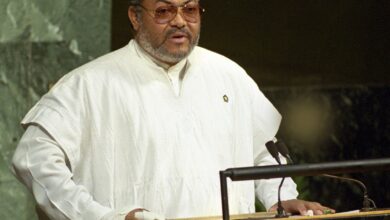
Ghana: Former President Jerry Rawlings Dies Aged 73 In Accra After A Short Illness
Ghana’s former President Jerry Rawlings breathed his last on Thursday in Accra. The 73-year-old died at the Korle Bu Teaching…
Read More » -
Guinea
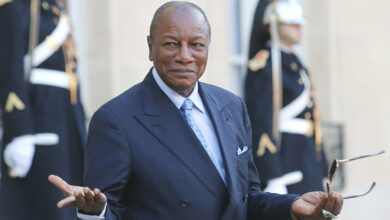
Guinea: Constitutional Court Approves Alpha Conde’s Victory In October Election
Guinea’s constitutional court on Saturday declared President Alpha Conde as the winner of the disputed election held last month, rejecting…
Read More » -
Guinea
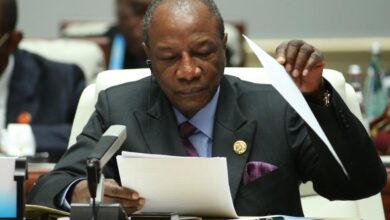
Guinea: Amnesty International Says At Least 10 People Killed In Police Firing
The international rights group, Amnesty International, on Sunday said at least 10 people were killed in Guinea in firing by…
Read More » -
Guinea
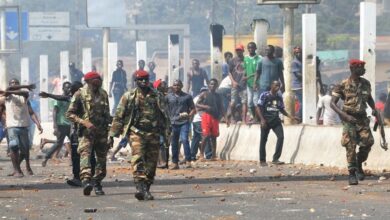
Guinea: Violence Erupts As Opposition Contests President Conde’s Winning Poll Results
Guinea’s capital Conakry was rocked by violence on Friday as supporters of opposition leader Cellou Diallo miffed with security forces…
Read More » -
Guinea

Guinea: Preliminary Results Show President Alpha Conde Leading As Protests Turn Deadly
Preliminary voting results from Guinea’s recently held presidential election show President Alpha Conde retaining the lead and beating his challengers…
Read More » -
Guinea
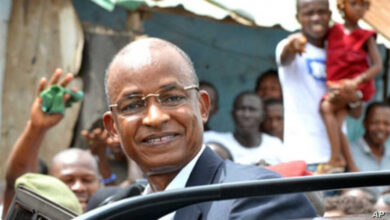
Guinea: Opposition Candidate Diallo Declares Himself As Election Winner
Guinea’s opposition candidate Cellou Dalein Diallo on Monday declared himself as the winner of the first round of the presidential…
Read More » -
Guinea
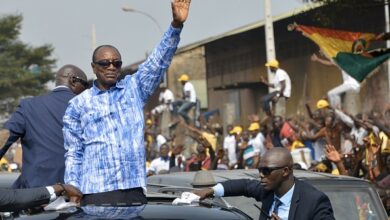
Guinea: People Vote To Elect Next President As Conde Seeks Controversial Third Term
The people of Guinea voted on Sunday to elect the country’s next president, as incumbent Alpha Conde seeks a controversial…
Read More » -
Guinea

Guinea: Opposition Group Says More Than 90 People Killed In Protests Ahead Of Polls
Guinea’s leading opposition group on Monday said over 90 people have been killed in a crackdown on protests against President…
Read More » -
Guinea
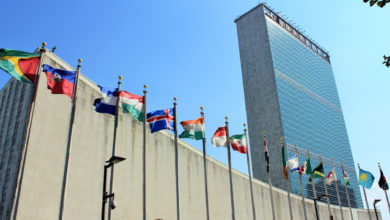
Guinea: United Nations Raises Alarm Over Rising Hate Speech Ahead Of October Elections
The United Nations has expressed alarm at ethnically charged hate speech rising in Guinea in the lead-up to the polls,…
Read More » -
Guinea

Guinea: Opposition Leader Calls Out ECOWAS To Intervene As Elections Inch Closer
Guinea’s main opposition leader Cellou Dalein Diallo has made an appeal to neighboring West African states to turn attention to…
Read More » -
Guinea

Guinea: Opposition Movement Plans Anti-Conde Protests Ahead Of October Vote
Guinea’s opposition movement has called for a new wave of protests against President Alpha Conde’s controversial bid to run for…
Read More » -
Guinea

Guinea: President Conde Vows To Represent Young People, Women In October Election
Guinea’s President Alpha Conde on Wednesday said he would be the candidate of young people and women in October’s election,…
Read More » -
Guinea

Guinea: President Conde Accepts Party’s Nomination To Run In October’s Election
Guinea’s President Alpha Conde has reportedly accepted his party’s nomination to run in October’s election, reported Reuters. Conde’s Rally of…
Read More » -
Guinea

Guinean Opposition Group Accuses President Conde & His Government Of Corruption
A group of Guinean opposition leaders has filed a lawsuit in France accusing President Alpha Conde and other members of…
Read More » -
Guinea

Guinea: President Alpha Conde Officially Enacts New Constitution In The Country
Alpha Conde, the president of Guinea, has enacted a new constitution after the people approved of the referendum in voting…
Read More » -
Guinea

Guinea: 91.59 Percent Of People Vote In Favor Of Adopting New Constitution
Guinea’s electoral body on Friday announced the people have voted overwhelmingly to support a contested new constitution, reported Africa News.…
Read More » -
Cape Verde

Guinea Votes In Contested Referendum And Parliamentary Poll Amid Coronavirus Fear
The people of Guinea on Sunday voted to elect members of parliament and on a constitutional referendum amid an opposition…
Read More » -
Guinea

Guinea: Francophone Countries Raises Question Over Credibility Of Electoral Register
The international association of French-speaking countries on Monday warned the electoral authorities of Guinea, raising concerns over the electoral register’s…
Read More »

